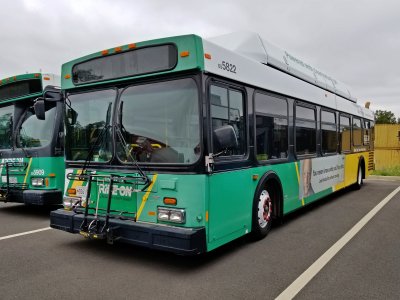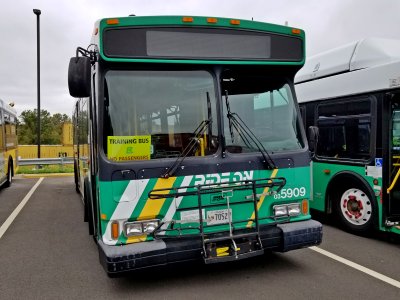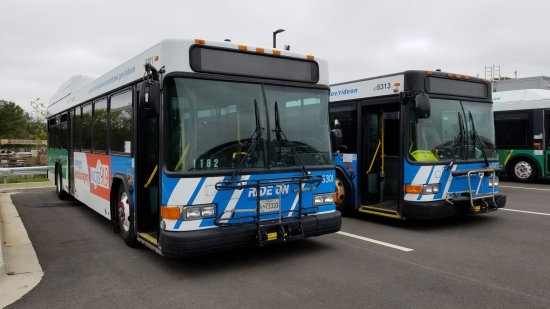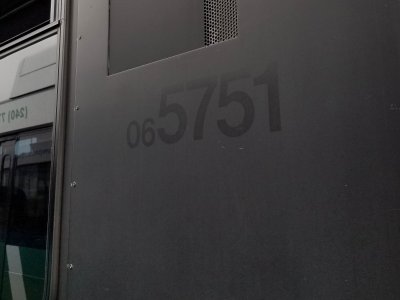This past Saturday, Elyse and I got together with our friend Dave, and we went to the Public Safety Open House held at the new Montgomery County Public Safety Training Academy on Snouffer School Road near Montgomery Village. Then we went out to Middletown and visited South Mountain Creamery, which is a dairy farm that sells products on site.
The Public Safety Open House event was a lot of fun. There was a little bit of everything for us to see there. We started out by looking at a row of Ride On buses. Apparently, this facility is used to train Ride On operators, because there is, more or less, one or two of each type of bus that Ride On operates located at the facility. We saw two Gillig hybrids, an Orion VII CNG, a New Flyer C40LF, and two Gillig 30-footers.

Ride On 5822, a New Flyer C40LF. We all commented on how the one panel on the front was so faded. No idea why. I speculated at the time that it might be from the diagonal parking at the old Gaithersburg division’s causing sunlight to hit that corner more than others, but after thinking some more about it, while certainly plausible, I don’t know if I’d necessarily go with it now.

Ride On 5909, an Orion VII CNG.

Ride On 5301 (left) and 5313 (right). These buses are both Gillig hybrids. 5301 (originally numbered 5751) is a 2006 model. Those buses had more white in their paint scheme than in 2007 and 2008. The 2007 buses had the same paint scheme, but with black trim framing the white areas. 5313 (originally numbered 5763) is a 2007. I’ve ridden both of these buses many times on the 51 route.

Labelscar showing the original number of bus 5301. The early Gillig hybrids were originally numbered starting with 5750, and were later renumbered starting at 5300, though I don’t know the date that this change was made.
There was also a former Ride On Orion I that had been painted for the fire department, but surprisingly, I didn’t get any photos of it. However, Elyse did:
Photo: Elyse Horvath
The fire department bus. I am told that this is former Ride On bus 5267.
Then we headed over to a University of Maryland medevac helicopter, N329PH, that was on display across the lot. That was a lot smaller than I imagined.
I certainly hope that any patient being transported here isn’t claustrophobic. It’s a tight space!
Meanwhile, this amused me:
Helicopter controls. Note the iPad to the side.
We also got to watch it take off:
Then while I was taking stills, Elyse got video of the takeoff:
After the helicopter left, we headed over to the emergency vehicles. One of the vehicles on display was the bomb squad’s vehicle. Here’s the bomb robot:
Another robot, being used to pick up a water bottle:
We also saw this vintage Cadillac ambulance:
Anyone else immediately think of the car from Ghostbusters? Beyond that, though, I was amazed to see an ambulance built on a car platform. I’ve always known ambulances as being on a truck platform.
Then here’s the interior:
Then we headed closer to Muncaster Mill Road, where we saw something very familiar:
I trust that you know what this is. This is WMATA railcar 4020, still with its mate 4021, at the Public Safety Training Academy. I’ve ridden this pair 13 times over the years: six times aboard 4020, and seven times on 4021.
We weren’t allowed to board, but we could certainly walk around and see the exterior. Elyse and Dave had never seen underneath the trains before, so this was their opportunity to take a look at the stuff below the platform level.
I was surprised to see that they didn’t connect the two cars back together after they arrived at the training center. Metro trains operate in married pairs, and so I would have figured that they would have set them in that configuration again.
One of the wheel trucks on 4020. Note the Breda builder’s plate on the truck.
Horn assembly on car 4020. The two things that look like horns are the traditional train horn, while that Wheelock 34T is a smaller horn used for other purposes.
Elyse poses for a photo with the 34T, pointing at it.
I also got photos of both Elyse and Dave pretending to climb into the train:
And then here’s an angle that you don’t normally see for a Metro train:
4021, viewed straight on from below.
From here, we stopped to watch firefighters climb ladders on a training building:
Then we headed over to the high bay facility, which can simulate various scenarios, such as a row of stores and an apartment building:
This place had everything. The simulated buildings are on one side, and there are traffic lights, road signs, and everything else that you might encounter as an emergency responder. They even had simulated fire alarms:
These gray Edwards Integrity horns with blue strobes were simulated fire alarms. The blue strobe differentiates it from the real fire alarm, which is made by Wheelock and has the normal white strobes.
Then this sign amused me:
CHS Pharmacy. I wonder what that’s supposed to represent…
Then on the way out, we saw two cars stacked somewhat on top of each other, to simulate an accident:
And by then, the event was over, and we headed out.
Elyse had wanted to go to South Mountain Creamery up near Middletown for a while, and so we decided, why not. I had never been to Middletown before, and so this was a bit of an adventure. South Mountain Creamery is a working dairy farm, and they make and sell their own products on site. We had the ice cream, and Elyse also bought a small pack of cheese to share.
After we had our ice cream, we toured some of the farm, going to the place where the recently born calves live. I was surprised to see a calf that had been born earlier that day in one of the pens:
I guess my surprise came in that I didn’t quite know what to expect as far as what a newborn cow looks like. I never would have thought that they were that large when they came out of the womb. Nor did I imagine that they would be that hairy when they come out, either. I suppose that I expected that a newborn calf would be bald, just like most human babies are born bald, and that the hair would grow in later.
We got a chance to talk to the employee tending to these calves. We learned a lot from her. We learned that the calves are raised to the age of two before they become productive. The bulls are then sold to other farms, and the cows begin to have calves of their own and produce milk for the farm. When the cows reach the end of their useful milk-producing life, they are also sold.
We each also got to name a cow. Elyse named a cow “Wiggles”. Dave named this bull “Dave”:
Then I named this bull, which had brown spots instead of black, “Gordon Brown”, after the British Prime Minister of the same name:
Then on the way out, we saw a retired fire truck on the property:
This fire truck is from Plymouth Township, Pennsylvania, which is near Philadelphia. Considering our activities earlier in the day, this seemed rather fitting to see.
So all in all, I’d say that we had a fun time. Very educational day on many different subjects, for sure.